May 16, 2025 | 05:33 GMT +7
May 16, 2025 | 05:33 GMT +7
Hotline: 0913.378.918
May 16, 2025 | 05:33 GMT +7
Hotline: 0913.378.918
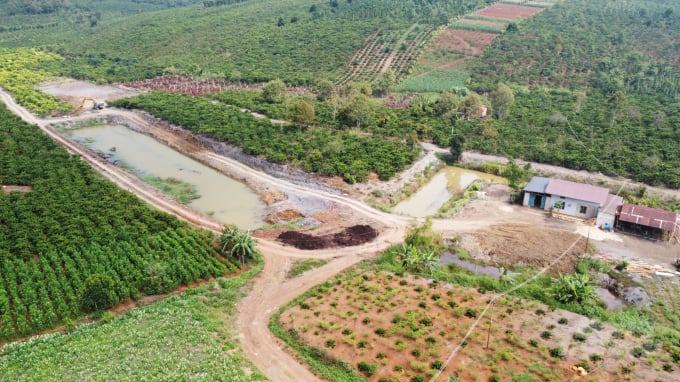
The community irrigation lake project in Di Linh district was built thanks to funding from IDH. Photo: Minh Hau.
During a visit and survey on the current status of coffee production and forest management and protection in Di Linh district, Lam Dong province, more than a month ago, Florika Fink-Hooijer, Director General of the General Department of Environment European, appreciated local efforts.
She said Di Linh has implemented many "positive" activities and achieved "positive" results, moving towards fully meeting the requirements of the EUDR that Europe has just issued.
Di Linh is currently the district with the largest coffee production area in Lam Dong province, with about 45,000 hectares. With nearly 83,000 hectares of forest, green almost covers the entire district.
The Department of Agriculture and Rural Development of Di Linh district is quite confident about EUDR because, over the past time, the locality has had many measures to encourage coffee producers to follow a sustainable model, fully meeting domestic and international standards.
This is because Di Linh has done a good job of managing and protecting the forest. Since 2019, the Sustainable Trade Initiative (IDH) has worked closely with the district (and Lac Duong district) to build sustainable coffee regions.
One of the approaches IDH offers at Di Linh is to build multi-value integrated coffee models. That is clearly shown in Tan Nghia commune, where Le Ngoc Toan's family donated land and made a community irrigation reservoir on an area of 3,000 square meters, with a capacity of more than 10,000 cubic meters of water.
The problem of irrigation water was a concern for many coffee growers in Tan Nghia commune because the drought caused a severe decrease in groundwater resources. However, thanks to Toan's community reservoir, more than 20 hectares of surrounding coffee trees have "lived well". Plants develop flowers and fruit at a higher height and ensure productivity.
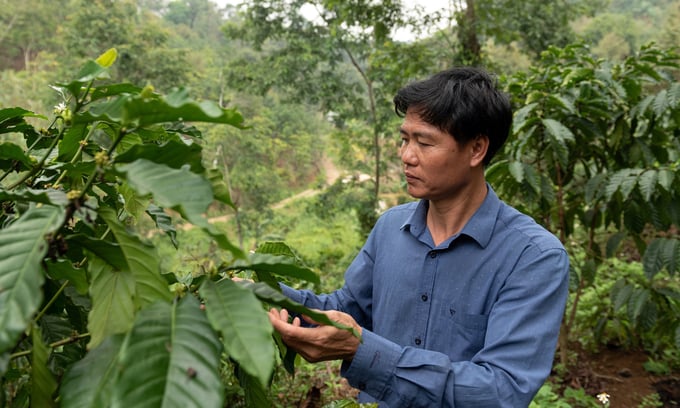
A farmer is taking care of coffee in Lam Dong province. Photo: WP.
Improving people's livelihoods is one of the goals targeted by the EUDR through increasing demand and buying and selling legal products and products that do not cause deforestation. If it is impossible to ensure people's lives and income, the regulations and legal procedures are challenging to implement synchronously in the locality.
This is also why IDH decided to support thousands of forestry seedlings, such as macadamia ... for farmers to apply intercropping in agricultural areas adjacent to forests. On forest land where people have been cultivating coffee stably for decades, forest trees are intercropped with the density according to the instructions of the technical staff.
The report of Di Linh District People's Committee in 2022 shows that the whole district has 14 cases of forestry violations, down 8 cases compared to 2021; the loss of forest products decreased by 26.3%; the area of deforestation decreased by 64%. These are examples of local sustainable coffee farming.
The EUDR prohibits the sale of goods and products within or outside the EU market unless companies or suppliers can verify three conditions: The products do not come from land deforested after December 31, 2020: Products are manufactured under the laws of the country in which they are manufactured; The products are certified by an appraisal statement.
Due diligence requirements are an essential part of the EUDR. Accordingly, companies must strictly follow a three-step owing diligence process before selling the relevant products on the EU market or exporting them.
Firstly, collect information, documents, and data to prove that the related products comply with the above three conditions. Second, conduct a risk assessment based on the collected documentation to determine if there is a risk of noncompliance. Third, apply risk mitigation measures such as gathering additional information, conducting independent surveys and audits, or supporting suppliers through capacity building or investment.
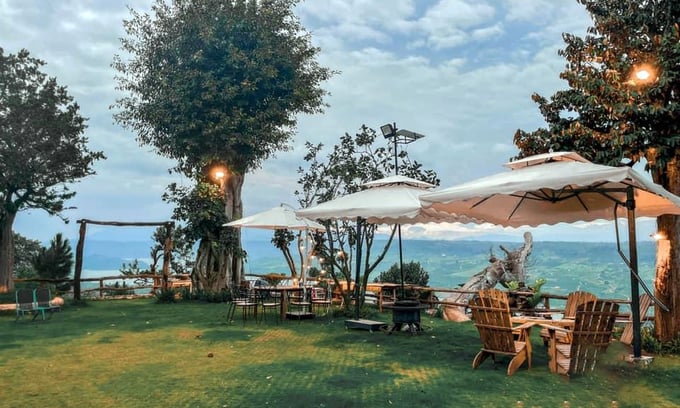
Many coffee spaces in Di Linh district have developed into tourist destinations thanks to the landscape approach. Photo: TL.
The new regulation also introduces a three-tier risk assessment system that will be implemented by the European Commission 18 months after the EUDR comes into force. This system will assess and classify countries as having high, standard, or low risk in producing products related to deforestation. The classification will consider criteria such as the rate of forest degradation in that country and the production trends of related goods.
After accessing EUDR regulations, Di Linh district has developed a plan to propagate and disseminate European regulations on supply chains that do not cause widespread deforestation among the people. At the same time, work with non-governmental organizations, purchasing companies, and coffee roasting corporations to implement solutions that meet EUDR regulations.
In the immediate future, Di Linh district will focus on determining coffee origin traceability by region while supporting people and businesses in building and perfecting product traceability, code issuance, and managing growing area code.
The district estimates there are about 80,000 coffee gardens in the area, and information on production areas and farming households has not been updated. Therefore, Di Linh will speed up the progress of building an information system on boundaries related to location and forest area as of December 31, 2020, as a basis to trace the origin of agricultural products as soon as required by the EU.
Translated by Tu Quyen

(VAN) Vietnam's draft amendment to Decree No. 156 proposes a mechanism for medicinal herb farming under forest canopies, linking economic development to population retention and the sustainable protection and development of forests.

(VAN) In reality, many craft village models combined with tourism in Son La have proven effective, bringing significant economic benefits to rural communities.

(VAN) The international conference titled Carbon Market: International experiences and recommendations for Vietnam was successfully held recently in Ho Chi Minh City.

(VAN) According to the Project on rearranging provincial and communal administrative units, in 2025, the country will have 34 provinces/cities, 3,321 communes, wards, and special zones, and no district-level organization.
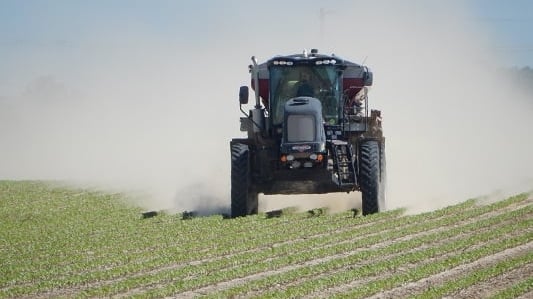
(VAN) The vice president of fertilizer with Stone X Group says the Trump administration’s tariffs are impacting fertilizer markets.
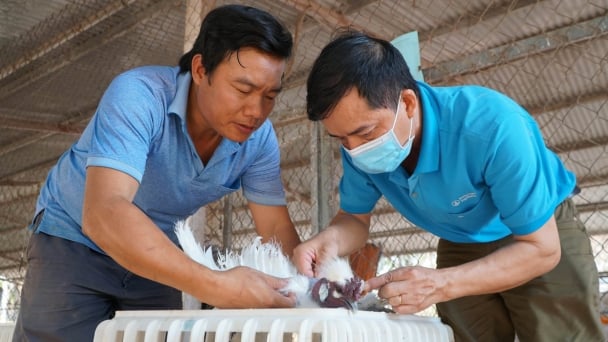
(VAN) Resolution 57 offers Vietnam a significant opportunity to narrow the global genetic technology disparity and convert its extensive genetic resources into commercial advantages.

(VAN) The Ministry of Agriculture and Environment will prioritize the implementation of five core and breakthrough solutions in science and technology, in addition to the seven groups of tasks identified in Decision No. 503.